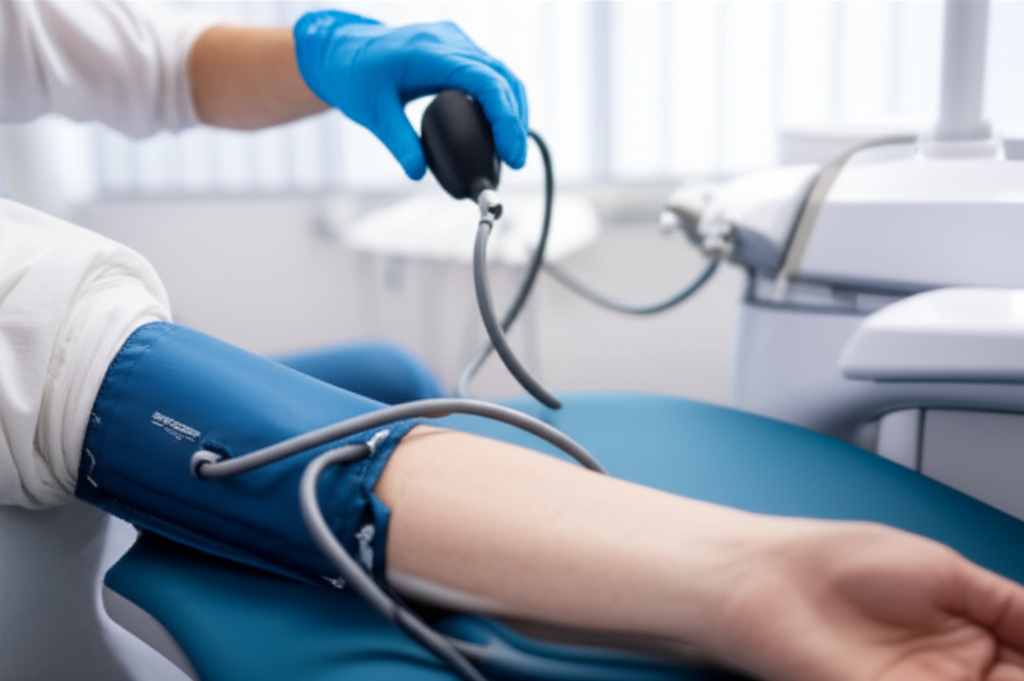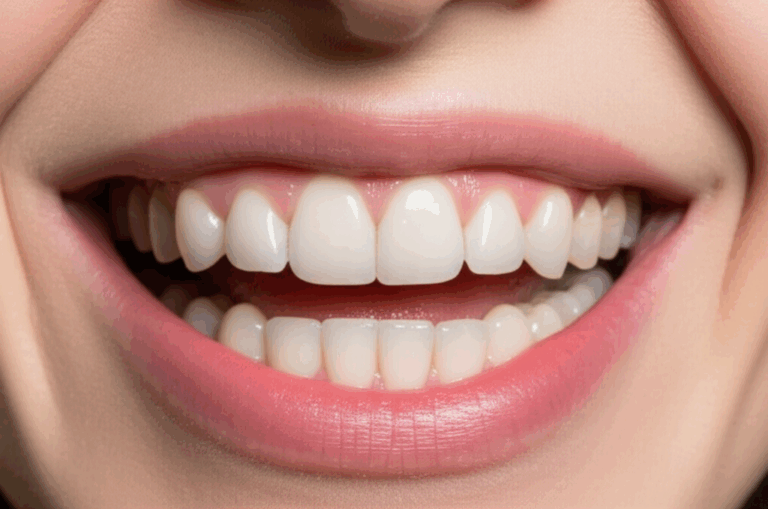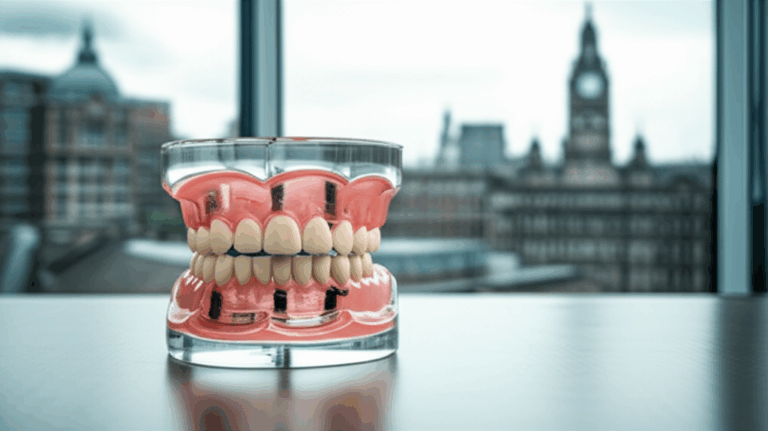
Are Dentists Required to Take Blood Pressure?
Table of Contents
Dentists care about your health. Checking blood pressure is a big part of this. You might wonder if they have to check it every time. In this guide, I’ll show you what they must do, what’s a smart idea, and what helps keep you safe.
I’ve been in the dental chair with the cuff on my arm. I asked why. The answer was clear. It’s there to keep you safe.
Why This Topic Matters to You
Problem: Lots of people don’t know their blood pressure. Some have high blood pressure and don’t know it. Dental visits can find it.
Agitate: High blood pressure raises your chance of stroke or heart problems. A simple dentist visit can be risky if nobody looks for it. Stress, pain, and numbing shots can make your number go up.
Solution: Ask for a blood pressure check at the dentist. Know your numbers. Pick a dentist who checks your vital signs and follows blood pressure guidelines. You’ll be safer, and you’ll feel better during care.
Is It a Law or a Best Practice?
Short answer: It depends.
Some states set rules with dental boards and laws. The rules are different in each state. Not every state makes it a must for every visit. Still, what dentists usually do is changing. Lots of dental offices now check blood pressure with your vital signs. It’s very common when you’re a new patient. It also happens before sedation, wisdom tooth removal, tooth pulling, or other big treatments.
Dental groups want dentists to check it. The American Dental Association (ADA) says to take blood pressure for new patients. They say to check it often at other visits too. This is most important if you’ll need local numbing shots with epinephrine, any type of sedation, or sleep dentistry. Some dental specialists are even stricter. Oral surgeons, gum doctors, and dentists who use sedation follow even tighter rules.
So is it “required”? For some treatments, yes. For all visits, not always by law. But it is a smart and common thing to do. It’s part of being a good dentist and keeping patients safe.
Why Do Dentists Check Blood Pressure?
Dentists don’t just look at teeth. They look at your overall health too. Your mouth is connected to your whole body. Blood pressure matters for a lot of reasons.
- Patient safety comes first: A quick check can stop a medical emergency. If you have badly controlled high blood pressure, the dentist might stop treatment. This can lower your risk of heart or brain problems.
- Anesthesia effects: Numbing shots with epinephrine can push up your blood pressure and heart rate for a short while. Laughing gas and other sedation can change levels too. They have to check and keep an eye out.
- Finding hidden problems: People sometimes see a dentist more than a doctor. The dental office can find high blood pressure you didn’t know about. A quick test could save your life.
- Dental risk: Some work is higher risk. Big tooth pulls, implants, deep cleanings, or full-mouth work can push up your blood pressure. Your dentist needs to check before these to plan things right.
- Medicine mix-ups: Dentists need to know what blood pressure medicines you’re on. Some drugs you take for high blood pressure can change how you handle dental drugs. Pain pills or steroids can also change your numbers. Dentists may change their plan to keep you steady.
A blood pressure check might feel routine, and it is. But it really matters.
What Do the Professional Guidelines Say?
The ADA has rules about this. They say:
- Check blood pressure for each new patient.
- Check again at later visits for regular care.
- Always check before any sedation or going to sleep for surgery.
- Check before big treatments or before using numbing shots with epinephrine.
Most state boards agree. Oral surgeons follow the American Association of Oral and Maxillofacial Surgeons (AAOMS) guidelines. They also give exact numbers that mean care should be delayed or a doctor should see you.
Dentists for kids ((AAPD) American Academy of Pediatric Dentistry) say that kids and teens should be checked at first and follow-up visits.
These rules are now a common way to keep patients safe, to help talk about risks, and to keep honest records.
When Is Blood Pressure Most Important in Dentistry?
You’ll have your blood pressure checked during these times:
- Before sedation: This means pills, IV, laughing gas, or sleep dentistry. Your dentist needs your numbers first. They’ll watch these numbers during your treatment too.
- Before big or painful work: Tooth surgery, pulling teeth, implants, or deep cleanings all affect blood pressure. A check helps keep things safer.
- If you have other health problems: If you have heart problems, diabetes, kidney issues, or a history of stroke, you should be checked. This is also very common in elderly patients.
- During a new patient check-up: Most offices check blood pressure the first time you visit.
- If you feel sick or have symptoms: Headaches, feeling dizzy, or seeing blurry can be signs of high blood pressure.
- Before using epinephrine: This medicine can make numbers go up. Dentists may use less or none if your blood pressure is high.
You might feel nervous at the dentist, which can make your numbers high. Dentists know this and may check again after a little rest.
What If Your Blood Pressure Is Too High at the Dentist?
If this happens:
- They might delay your treatment: If your number is very high, your dentist might wait. They want to keep you safe.
- They may send you to your doctor: Your dentist might want you to see your regular doctor and get your blood pressure under control.
- Emergency steps: If your numbers are really, really high, the dental office will follow an emergency plan. Dental staff are trained for this.
- Change in treatment: Your dentist can use less epinephrine, change pain management, break up visits into shorter appointments, or offer laughing gas to help you feel better.
You should always be told what’s happening and why. Ask questions any time.
How Do Dentists Measure Blood Pressure?
It’s easy. You sit in the chair. You rest a few minutes. They put a cuff on your arm. They may use an electronic blood pressure machine or a manual one with a stethoscope. Both are okay.
- Electronic vs. manual: Both are good if used right. Electronic is faster. Manual needs more skill, but is also good.
- The right way: The cuff should fit your arm. Your arm should be at heart level. Don’t talk while it’s checked. Their machines should be checked and fixed if needed.
- Recording results: They write your blood pressure down in your chart. They keep records to watch for problems later.
What Should You Tell Your Dentist?
You are a big part of staying safe.
- Share your health story: Fully fill out your health form. Update it at every visit. List high blood pressure, low blood pressure, diabetes, kidney problems, pregnancy, and heart problems.
- List your medicines: Bring a list of your blood pressure meds, blood thinners, and any pain or steroid pills. This helps your dentist help you.
- Talk about nerves and pain: If you are scared or nervous, tell your dentist. This can make your blood pressure go up. Talking helps the dentist make things easier.
- Ask and agree: You have the right to know why your blood pressure is checked. You can say yes to the check and ask what happens if numbers are high.
Arrive early. Sit and relax a few minutes. Try to skip coffee, soda, or tobacco right before your visit.
Can a Dentist Diagnose High Blood Pressure?
Dentists can spot a high number and tell you to see your doctor. But only your doctor can officially say you have high blood pressure and give medicine for it (except rare cases).
So, dentists can find a problem. They can write it down and send you to your doctor. They help keep you safe, but they won’t make a medical diagnosis.
This teamwork is good for everyone. Your dental visit can help find a health problem early.
How Do Medicines and Procedures Affect Blood Pressure?
Dentists think about drug effects and treatment risks:
- Numbing shots with epinephrine: Epinephrine is good for most people but can raise your blood pressure and heart rate. The dentist can use less or none if needed.
- Sedation and sleep dentistry: These need extra care and checking. Blood pressure is checked before, during, and after.
- Pain and nerves: Both can push blood pressure up. Calming techniques help keep things safer.
- Medicines: Some pain meds and steroids can make blood pressure rise. Blood thinners matter too. Dentists try to balance pain and safety.
- Other dental work: Braces, gum care, root canals, implants, and crowns can all be stressful. Good planning makes things go smoother.
Dentists look for signs of trouble and may change the plan.
What About Kids, Teens, Seniors, Pregnancy, and Special Health Needs?
Dentists change their care for each patient.
- Kids: The AAPD says screen children and teens for blood pressure at first and later visits.
- Seniors: Older patients more often have high blood pressure or other health problems. Checks help keep these patients safer.
- Pregnancy: Pregnant patients get checked too. This helps find things like preeclampsia and guides safe pain control.
- Diabetes and kidney problems: These raise your risk, so checking blood pressure is extra important.
- Athletes and grinders: For people who grind their teeth or play sports, pain might increase blood pressure. Using a high quality night guard can help.
A simple check makes care safer for everyone.
How Labs and Technology Help Make Care Safer
How does a lab matter for blood pressure? Here’s how: When a crown or bridge fits right, your visit is faster. Shorter time in the chair means less stress and an easier blood pressure.
- Digital tools: Dental labs with good systems get things right the first time. You spend less time in the chair and feel less stressed. Find out more at digital dental lab.
- Crowns and bridges: Well-made crowns and bridges go in faster and easier. Learn more here: crown and bridge lab.
- Implants: Implant work needs tight planning. Parts that fit well lead to easier and safer visits.
- Night guards: If you grind your teeth at night, you may be sore and more stressed at the dentist. A good night guard can help.
A good dental team and a good dental lab make visits easier and safer.
Data, Cases, and Stats You Should Know
Here’s a quick look at key numbers:
| Category | Key Data/Statistics/Findings | Source/Context | What It Means for Dentistry |
|---|---|---|---|
| Hypertension rates | 47% of U.S. adults have high blood pressure | CDC (2017–2018) | Almost half of patients may have it |
| Undiagnosed/uncontrolled | About 20% not diagnosed or not controlled | Medical and dental studies | Dental offices help find these patients |
| Epinephrine effect | Epinephrine can raise blood pressure for a little while | Dental drug books | Limit it in high blood pressure patients |
| Dangerous high | Over 180/110 mmHg is risky | AAOMS rules | Delay care, send to a doctor |
| Screening works | Dental offices are good at finding high blood pressure | JADA and public health studies | Helps spot problems earlier |
| New found cases | About 1 in 10 dental patients with high blood pressure didn’t know it | Public health programs | Adds another safety check |
| ADA advice | ADA says check blood pressure at new and ongoing care | ADA Statement | Shows how common this is |
| Pediatric advice | AAPD says to screen kids and teens | AAPD | Kids need to be checked too |
| Safety wins | Checking blood pressure stops emergencies | Dentist experience | Care is safer |
| Legal risk | Not checking can get dentists in trouble | Legal cases | It’s smart and protects everyone |
These numbers show why a simple check at the dentist matters for everyone, young or old and for all types of dental care.
Simple Tips to Keep Your Numbers Safer at the Dentist
Here’s how you can help:
- Get to your appointment a little early. Relax and breathe slowly.
- Skip coffee, sodas, or smoking before your visit.
- Bring your medicine list. Take your usual blood pressure pills as your doctor says.
- Tell the staff if you’re nervous. Ask for a few minutes to rest before your blood pressure check.
- Ask for short breaks during long treatments.
- Ask about pain control that doesn’t increase blood pressure.
- If your reading is high, ask to check again after resting for a few minutes.
This is your health, and you’re in charge.
Frequently Asked Questions
Q: Is it normal for dentists to check blood pressure?
A: Yes. Most dentists check blood pressure at your first visit and before big treatments. It’s standard.
Q: Can dentists say you have high blood pressure?
A: Dentists can screen and tell you to see your doctor.
Q: What if the dentist says my blood pressure is high?
A: The dentist may wait, change plans, or tell you to see your regular doctor. In emergencies, they know what to do.
Q: Does dental numbing raise blood pressure?
A: Numbing shots with epinephrine can raise blood pressure for a bit. Your dentist may use less in people with high blood pressure.
Q: Should kids get their blood pressure checked at the dentist?
A: Yes, the AAPD says to screen children and teens during dental care.
Q: What’s too high for dental treatment?
A: Over 180/110 mmHg is usually too high for regular care; your dentist may delay work and send you to your doctor.
Q: Should I tell my dentist about my medicines?
A: Yes. Always tell your dentist what you take, including blood pressure pills, blood thinners, and pain meds.
Key Takeaways
- Dentists check blood pressure to keep you safe and avoid emergencies.
- State laws are different, but the ADA and others say to check blood pressure often.
- Checks are most important before sedation, anesthesia, or big treatments.
- High numbers might mean your visit is delayed, your plan changes, or you’re sent to your doctor.
- Share your medical history and medicine list every visit.
- Numbing shots with epinephrine can push up blood pressure for a short time.
- A dental visit is a good chance to find hidden high blood pressure.
- Labs that do quality work make visits shorter and less stressful.
- Ask questions, agree to checks, and stay part of your own care.
References
- American Dental Association (ADA). Statement on Hypertension and Heart Disease. https://www.ada.org
- Centers for Disease Control and Prevention (CDC). Facts About Hypertension. https://www.cdc.gov/bloodpressure/
- American Association of Oral and Maxillofacial Surgeons (AAOMS). Office-based Anesthesia Parameters and Guidelines. https://www.aaoms.org
- American Academy of Pediatric Dentistry (AAPD). Monitoring and Management of Pediatric Patients. https://www.aapd.org
- Journal of the American Dental Association (JADA). Research on Hypertension Screening in Dental Settings. https://jada.ada.org
Important Notes
- This article uses dental guidelines and current research. It does not replace advice from your dentist or doctor.
- If you have signs of very high blood pressure, call your doctor. For emergencies, call emergency services right away.








